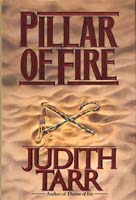 Pillar
of Fire
Pillar
of Fire
by Judith Tarr
A book review by Mark L. Olson
Forge 1995, $23.95, 448 pp
Tor seems to have made a deliberate decision to remarket Judy Tarr as a writer of historicals rather than a fantasist. I assume that the market for historicals is larger, or at least more lucrative. At any rate, Pillar of Fire, which is precisely the same kind of book as Lord of the Two Lands — meticulous historical fiction with a dash of the fantastic thrown in — was published under the Forge imprint (rather than Tor) and is shelved under general fiction.
I think this was one of the first sold this way, and unfortunately it presages a drift away from the fantastic historicals that she does so well.
In each of the crossover books she's done the fantastic part has been cleverly done so that it just, possibly, could be true. For example, in Lord of the Two Lands, an Egyptian priestess aids Alexander's conquest of Egypt at her god's direction. She doesn't call down lightnings on an opposing army, or turn its soldiers into toads or anything else which might have been noted in contemporary records. Instead, her intervention is with critical individuals and in intelligence matters known to Alexander alone. It's done with subtlety and considerable skill. The magic is real, but you have to feel that things might well have gone the same way without it.
Pillar of Fire handles a slightly different situation slightly differently. The fantastic element is larger, but Tarr still manages to balance historical honesty with a good story.
Pillar of Fire in the story of Moses and the Exodus of the Israelites from Egypt. Tarr chooses to treat the Biblical story as just another historical record of the times: imperfect and biased, but the only real written record surviving. She draws on centuries of Egyptology (and some admittedly far-out historical theories) to reconcile it with the archeological record. And she does it all as a well-written, interesting novel about real people.
The book is written from the point of view of Nofret, a Hittite girl who was sold as a slave in Egypt and became chief slave to one of the Princesses of Egypt. Nofret herself has an engaging personality – very very stubborn – and finds herself a prime mover in the great events of the time. The princess' father is the Heretic Pharaoh, Akenaten and as the story starts Nofret is in Akenaten's new capitol the Horizon of Aten (Aten is the name of Akenaten's sun God which he believes is the only God). Akenaten himself is a particularly well-drawn character, a man completely besotted with his God and frequently neglecting the job of running his kingdom.
The fact that a book like this can be marketing as general fiction is further evidence that SF and Fantasy have been so absorbed into the mainstream of American culture that SF as a separate entity (not to mention SF as a ghetto) is ultimately doomed.
This is a superb fantasy that due to marketing will probably never be recognized as such. Judith Tarr is well on her way to becoming a master of the art — I do hope that she isn't forgotten by us just as she gets there.
This will certainly be one of my Hugo nominees for 1995.
See my other Judith Tarr reviews: Household Gods
NESFA homepage | Review Index | More Reviews by Mark L. Olson
